7 easy tricks to boost your productivity
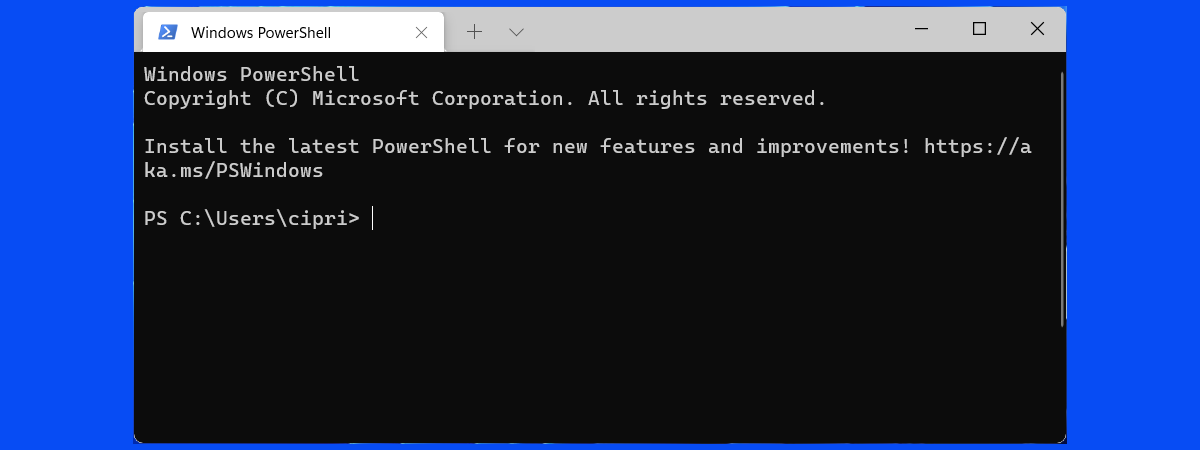
I spend plenty of time tweaking my tools, and Windows Terminal is one of my favorites. It’s not just about its look or modern feel: Windows Terminal manages to make daily tasks quicker and simpler, offering a user experience that’s far superior to older command-line interfaces. I’ve often come across new ways this tool can save me precious time that I’d otherwise spend jumping between different apps and windows. Over time, I’ve gathered a couple of straightforward yet powerful tricks that I believe improve my productivity, turning routine command-line tasks into actions that are both faster and easier to take. Here they are:
1. Easy copy & paste
Copying and pasting in Windows Terminal is surprisingly intuitive and saves me precious time. To copy text, I simply highlight the content using my mouse, and the text is automatically copied to the clipboard. There are no additional clicks needed. To paste the copied content into the Terminal, all I have to do is right-click anywhere inside the Terminal window.
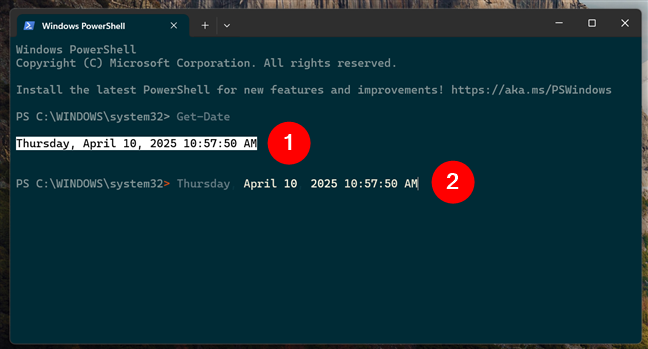
Copying and pasting in the Windows Terminal
This quick method avoids the inconvenience of complicated keyboard shortcuts.
2. Cleaner clipboard pasting
Sometimes, when copying from web pages or documents, unwanted formatting or spaces end up in my Terminal commands, causing unnecessary errors. Fortunately, Windows Terminal offers a neat solution by allowing me to paste plain text without any formatting. To benefit from this helpful feature, you need to go into Settings, select Interaction, and make sure that the Remove trailing white-space in pasted text option is enabled.
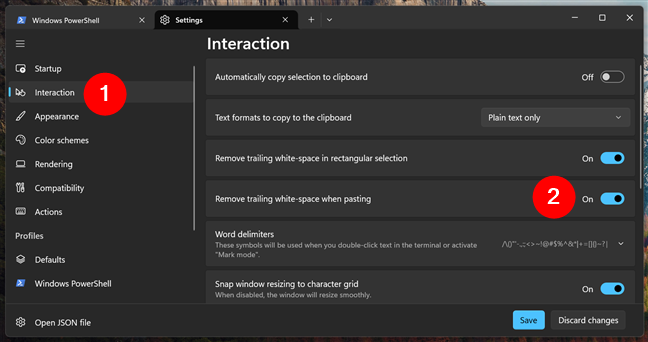

Enable Remove trailing white-space when pasting
With this simple adjustment, you can make sure that any content you paste is always clean.
TIP: Does changing the way your Terminal looks and works sound interesting? Here’s how to customize Windows Terminal.
3. Improve multitasking with transparency
Transparency in Windows Terminal isn’t just a choice about good looks. It can also significantly improve the way you multitask. For example, I frequently refer to documentation or other windows behind the Terminal while running commands.
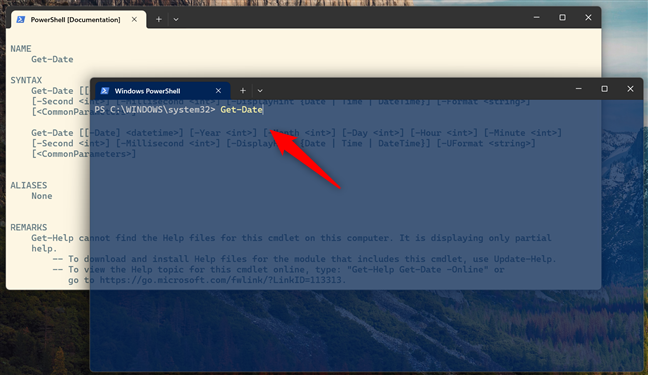

Using a transparent PowerShell profile together with matte profile
To adjust transparency, access the Settings menu, select your active profile, and then find and tap the Appearance section.
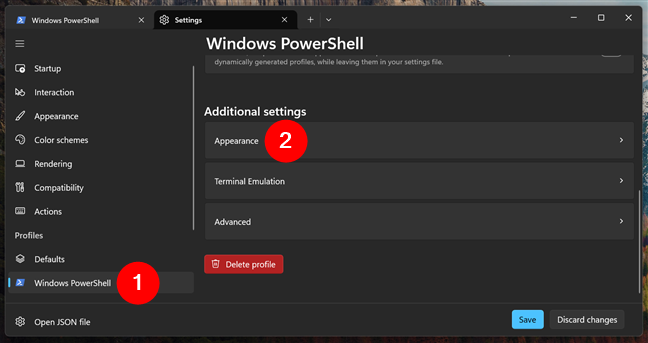

Access Settings and go to the profile’s Appearance
There, you’ll find a slider labeled Background opacity, which you can adjust according to your preferences.
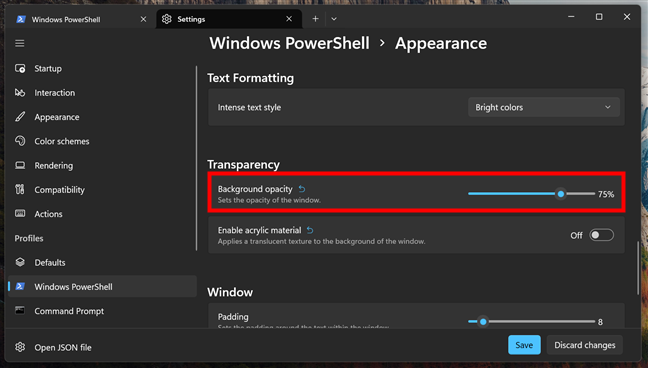

Adjust the Background opacity setting
Increasing transparency makes the Terminal blend in, letting you easily check content without constantly switching windows.
TIP: Would you like to know more about configuring how your Terminal profiles look and behave? This might be interesting: How to customize Windows Terminal Profiles.
4. Maximize workspace with full-screen mode
When working mainly in Terminal, maximizing my workspace is essential for clarity and efficiency. Thankfully, Windows Terminal has an easy full-screen mode that is accessible with simple shortcuts. Pressing…
F11
or
Alt + Enter
…quickly toggles full-screen mode, instantly providing more space for command outputs and readability.
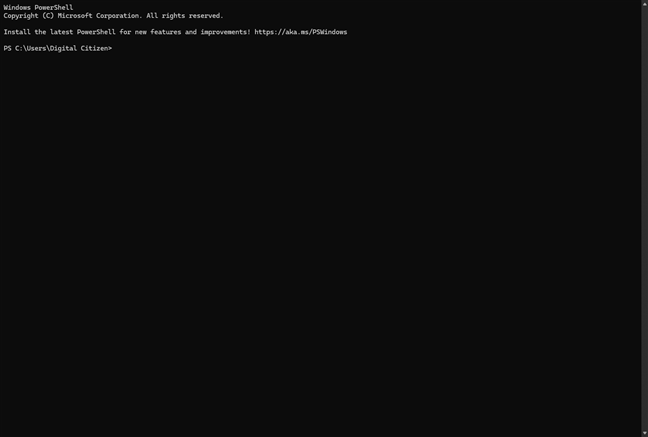

Using Windows Terminal in full-screen mode
To exit full-screen, pressing the same shortcut restores the Terminal to its standard window size.
5. Manage multiple tasks with panes
Running multiple tasks simultaneously becomes easier with the pane feature in Windows Terminal. Rather than opening separate Terminal windows, I split my existing window into multiple panes. To split vertically, I use the shortcut:
Alt + Shift + D
…and for a horizontal split:
Alt + Shift + Minus (-)
This helps me efficiently monitor multiple processes, such as tracking information in one pane while running commands in another.
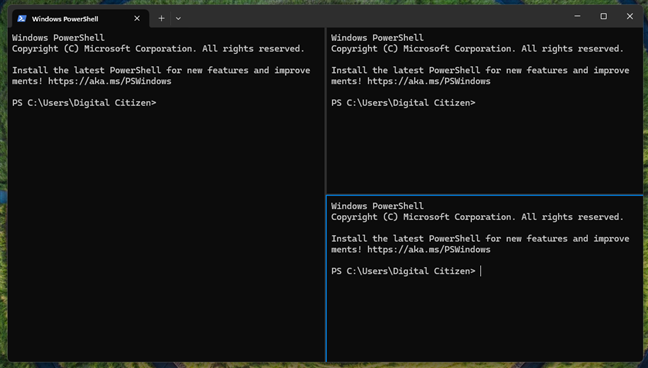

Opening multiple panes in Windows Terminal
I believe this improves my overall productivity, and it also helps declutter my desktop.
6. Customize the startup profile
One of the most convenient productivity boosts is customizing the Terminal profile that opens by default. Windows Terminal supports several shells like PowerShell, Command Prompt, Azure Cloud Shell, and Ubuntu. All you need to do is navigate to the Terminal Settings and select your favorite shell as the Default profile in the Startup tab.


Choose the Default profile at Terminal Startup
Then, every time you launch Terminal, your chosen environment automatically opens, saving you the repetitive task of switching profiles each session.
7. Boost efficiency with keyboard shortcuts
Keyboard shortcuts are some of the most powerful productivity boosts, drastically reducing the time you spend navigating through menus. Thee shortcuts I use daily in Windows Terminal include:
- Ctrl + Shift + T to quickly open a new tab.
- Ctrl + Shift + W to close the current tab without any mouse clicks.
- Ctrl + Tab and Ctrl + Shift + Tab to easily cycle between open tabs.
- Ctrl + Shift + F to open the search bar when I need to find something in Terminal’s history.
- Ctrl + + (plus) and Ctrl + – (minus) let me zoom in or out on the text.
- Ctrl + Shift + P brings up the command list, giving me quick access to just about every Terminal function, from changing color schemes to restarting the shell. Moreover, it also shows the keyboard shortcuts associated with those functions, which makes it, in a way, the most powerful command in Windows Terminal.
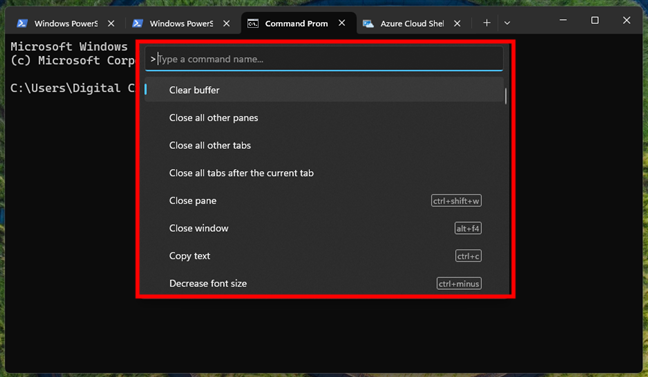

Access the command list in Windows Terminal
Mastering such keyboard shortcuts can help you navigate the Terminal faster, allowing you to focus more on what you need to do.
What’s your favourite Windows Terminal trick?
These tricks change the way I use Windows Terminal. From handling text easily to multitasking with multiple panes, each shortcut contributes to making my work in the Terminal more efficient. If you’re using the Terminal often, too, I encourage you to try these tips. Furthermore, if you have others worth adding to my list, don’t hesitate to let me know in the comments section below.
Source link


